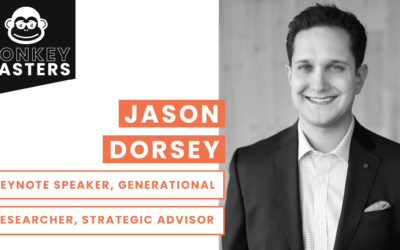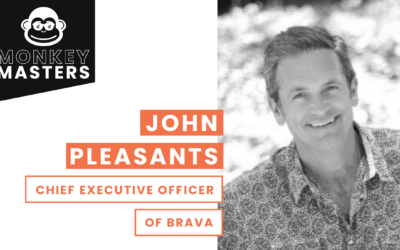For my fourth Monkey Masters installment, I am thrilled to interview Rusty Shelton.
Rusty is an entrepreneurial jack of all trades! Author, speaker and business owner, Rusty has done and seen it all. Prior to founding his current agency, Zilker Media, Rusty built and sold two companies before the age of 35.
On top of his role at Zilker Media, Rusty is an active NSA speaker, Entrepreneur Organization’s Board Member and he sits on the University of Texas, Texas Exes PR Committee while simultaneously raising his young family. Now that’s a full plate! Now, I’m excited for you to hear from the incredible Monkey Master, Rusty Shelton.
Why did you decide to become an entrepreneur? What 1-2 things from your life, your upbringing or professional experience drove you to eventually take the plunge into the great unknown?
As I look back the one thing that stands out to me as a potential precursor to becoming an entrepreneur was a deep love for trading baseball and football cards. I loved the art of the deal as young as 8 years old and I would look forward to trading cards each week with buddies. I would beg my parents to take me to baseball card shows, which were held in local hotels, so I could wheel and deal with the vendors there. I would save all of my money each month and “invest” in packs, boxes and cards and then turn around and look to turn a profit with my friends the following week.
I do remember thinking that it would be cool someday to own my own business but I had no idea what kind of business that might be. It was fleeting – not really like a deep-held belief – but I remember thinking about it from time to time as a kid.
The urge to start something didn’t return in earnest until about five years into my career. I had worked my way up to Managing Director at a local book PR firm in Austin and saw a hole in the market for a firm that could manage all aspects of an author’s brand – PR, social media, website, email marketing, etc – instead of the way it was done, which required an author to hire and manage multiple vendors in each vertical. I did my best to drive that change at the firm where I was but, luckily for me, the owners didn’t really want to expand beyond PR and refused to sell the business to me. Eventually, I became frustrated enough to start building a vision for my own firm but it would take me a couple of years to muster up the courage to jump out and give it a shot.
What mental hurdles held you back and how did that manifest itself in your leadership/decision-making/personal well-being?
My biggest mental hurdle by far was a preoccupation about the downside if I failed. At the time I was in my late twenties and my wife and I had two kids at home in diapers. I was making enough in my job for my wife, Paige, to be a stay-at-home Mom, which is what she really wanted to do while the kids were young. I stared at the ceiling many a night going back and forth on the risk/reward of jumping out and starting a company because I knew if I failed, it wasn’t just me that was going to have to go out and find another job but also likely her too, bringing an end to her ability to stay home with the kids. We didn’t really have much money – we had just bought a house and had $6k in the bank and no backstop other than me going to my parents to ask for money and I wanted to avoid that at all costs.
Based on that lack of foundational cash for the business, my mind would often wander into a question about whether or not I was being selfish for wanting to jump out and take this risk because if I failed the downside was huge for my family. After all, we were comfortable and we had much of what we wanted already. I talked myself into believing it would be selfish to jump out and take the chance for roughly two years before my wife and I finally agreed that the reward out-weighed the risks. In truth, she was convinced far before I was and that confidence in me was one of the big things that got me over the hump because I knew we were on the same page with the risk we were taking.
As painful as my own mental back and forth was at the time, when I look back I’m thankful I spent as long as I did in that previous role because it allowed me to learn so much about what to do – and what not to do – as a leader and gave me a chance to build relationships that I would leverage with the new business. The timing ended up being just right.
What one piece of advice would you give to your previous self when you were first starting out?
Just one?
So many but probably the most important would be to get out of the way as quickly as possible.
Throughout the early years of my first agency I had the mistaken belief that I needed to personally be involved with just about every part of the business – particularly when it came to client-related activities. I wanted to be on every call, every email and involved in every single deliverable that went out to clients.
To be clear, I didn’t involve myself because I didn’t think my team could do the job – we had a great culture and I knew I was far from the smartest person in the room – I did it because I felt like it was my responsibility to be involved in everything as the owner.
Looking back that was a massive, massive mistake that I would tell myself to avoid.
The results of this misplaced sense of duty (and perhaps even an inflated sense of self-importance) early in my entrepreneurial career were many:
- I prevented my team from growing and caused unnecessary turnover as a result
- I prevented my clients from the benefit of having multiple perspectives on their account
- I became overwhelmingly burned out and missed out on more family time when my boys were young than I would like to admit
- I limited the growth of the agency because I couldn’t (wouldn’t?) remove myself from operations
In summary, I would go back and tell myself that by over-involving myself in every aspect of the business that I was doing the company, our team, our clients, myself and my family a massive disservice. The reality is that kind of wall-to-wall commitment is required right out of the gate in a new venture but as the team builds, if a founder does anything other than focus on best and highest use and allow their team to do exactly the same thing, they are holding the business back.
What was the biggest surprise for you about being an entrepreneur? What do you know now that you wished you then?
Entrepreneurship is full of surprises and I certainly have had my fair share of them but the one that stands out to me the most hit me after our first agency was acquired.
Most entrepreneurs romanticize the notion of selling a business. In fact, I can remember rolling my eyes when I would read interviews with entrepreneurs who would talk about the emotional roller coaster that took place for them after they sold their business, thinking “are you kidding me – you hit the lottery – how could you possibly be anything but super happy?”
I was completely unprepared for that same emotional roller coaster to hit me after the acquisition. What’s remarkable as I look back is the acquisition went really well – I still do a ton of work with the company that acquired us and I’m great friends with the entrepreneur who owns the company. In fact, it’s the rare story where both the buy-side and sell-side founders are better friends five years later than the day it happened.
But despite the facts all being really positive, I struggled with a bit of an identity crisis after the business sold. I didn’t realize how much of my self-image and identity had become wrapped up in being the leader of an amazing team and that was a tough (and unexpected) pill to digest.
If I could go back, I wouldn’t change a thing about the acquisition – I think it has worked out really well for all parties – but I would go back and better prepare myself for the roller coaster I was heading into.
Who are your entrepreneurial (or life) heroes?
I have been blessed by so many people during my journey – way more than I deserve.
My wife Paige and I are high school sweethearts and have been married 17 years. Everything starts with her, including my entrepreneurial journey. When I was going back and forth on whether or not I should start the first business she would constantly remind me “what’s the worst that can happen?” It gave me a good perspective and also made clear that she and I were on the same page going into a brand new venture. She was also knee-deep in the trenches those first few years with the kids when I was wall-to-wall on the work front – we’ve been a team the whole way through.
My family taught me tons and put me in position to succeed. My Dad taught me important lessons on hard work, relationship-building & integrity. My Mom provided an example of how to focus on serving others with a spirit of optimism and fun. And my sister showed me how to overcome obstacles, build meaningful relationships and take calculated risks. I don’t do any of these things as well as they do but they gave me a great example to work toward.
Add to that plenty of business mentors, from Clint Greenleaf, who is now a partner at Zilker Media, who opened many a door for me that he didn’t have to, to Mike Odom who gave me my first real job and taught me how to sell and build relationships.
I have a voice in my head that fills me with fear, uncertainty and doubt. I call him Mr. Monkey. Do you have a voice like him? How does he try and screw with you? How do you quiet him (or her or it) down?
I have that one too but I mainly find he rears his head around new endeavors – things I haven’t done before where I’m not as clear on the upside or downside and not sure if I can do it well. I paid a lot more attention to him early in my journey but I’m better now at leaning on peers, partners and family to keep myself on the right track. I think that’s one of the biggest advantages of experience – you start recognizing the helpful and productive voices and continuing to filter and remove all of the others.
Just one last question before we end our interview, did you keep any of those baseball cards? I bet they’d be worth a fortune today…
HA – much to the chagrin of my wife I still have just about all of my cards. We dragged them around to every place we lived and I would throw out the obligatory ‘someday the market will come back honey!’ – earning me an eye roll every time (particularly after we had kids). As you mention, I am seeing some of the cards I have sell for a fortune today, so I may be proven right but I may have a hard time letting go of some of them. I just sent a bunch of rookies off to get graded so I’ll keep you posted!
Rusty Shelton Full Bio (linked in here)
Rusty Shelton is the Founder & CEO of Zilker Media, the country’s premier agency for authors, thought leaders and brands who want to build a platform and make an impact in the new media landscape.
Rusty’s commentary on the changing world of PR and marketing has been featured in Forbes, Inc. Magazine, Wharton, HuffPost and many other top media outlets.
Prior to founding Zilker Media, he built and sold two businesses before the age of 35. Rusty launched his first business, Shelton Interactive, in 2010 and worked alongside a dream team to grow it into one of the nation’s most respected digital marketing agencies. The company handled the launch of more than 30 New York Times & Wall Street Journal bestsellers and represented some of the world’s most recognized authorities, including Capt. “Sully” Sullenberger, Tom Rath & many others. The company was also named one of the nation’s top 10 social media marketing agencies in 2014 and 2015 by research agency Clutch.
An active NSA speaker, Rusty speaks regularly at top conferences and leads workshops for businesses of every size. He has spoken at EO Alchemy, SXSW Interactive, FPA (Financial Planning Conference), Million Dollar Round Table (MDRT) and has been a faculty member at the Harvard Medical School Publishing Course for the past 10 years.
—
Big thank you to Rusty for participating in Monkey Masters! Be sure to be on the lookout for my next interview and all future blogs here.
AND if you haven’t yet… be sure to take the The Entrepreneur Survival Test and test your skills.


